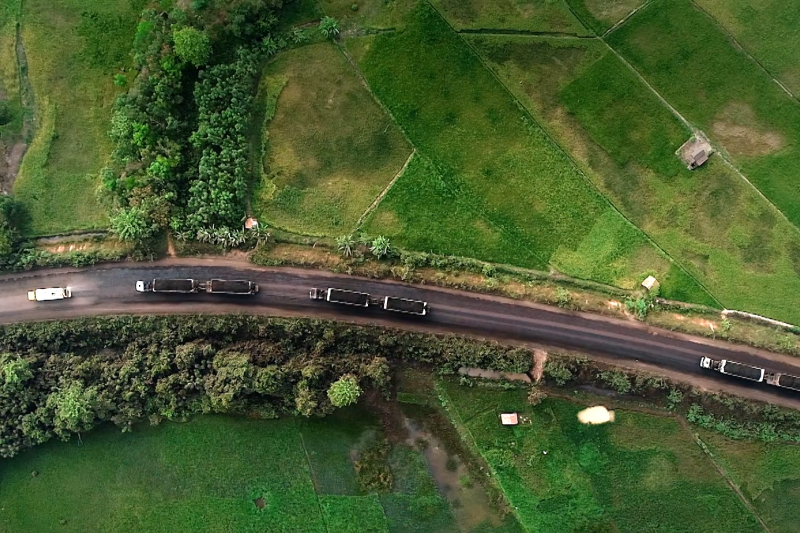PT Titan Infra Sejahtera (TIS), through its subsidiary PT Servo Lintas Raya, has officially operationalized a 118-kilometer dedicated coal road in South Sumatra (Sumsel). The Rp1.2 trillion infrastructure project addresses two decades of public road damage caused by coal transportation while optimizing the 2025 coal production target of 131 million tons. This initiative underscores TIS’s commitment as an industry player to tackle infrastructure challenges while maintaining environmental sustainability.
Major Investment and Advanced Technology
The specialized road, stretching from Muara Enim to PT Swarnadwipa Dermaga Jaya’s coal port on the Musi River, was built using cutting-edge technology. The 40 cm-thick asphalt, reinforced with a polymer mixture, can withstand truck loads of up to 50 tons. A GPS tracking system is installed across the fleet to monitor speed, cargo, and routes in real time. Additionally, 15 checkpoints are equipped with load-testing tools and vehicle condition sensors.
“We enforce a maximum truck speed of 40 km/h and mandate the use of specialized tires to reduce vibration impacts. Violations will face strict penalties,” explained Yayan Suhendri, Head of Government Relations at PT Servo Lintas Raya, during a press conference in Palembang on Thursday, June 20.
Government Collaboration and Positive Impact
The dedicated road aligns with Law No. 22 of 2009 on Traffic and Road Transportation, which prohibits the use of public roads for large-scale mining transport. Since its operation began in January 2025, the TIS project has reduced coal truck traffic on public roads by 60%. In PALI Regency, public vehicle travel time dropped from 2 hours to 30 minutes.
South Sumatra’s Central Statistics Agency (BPS) recorded a 45% decline in coal truck accidents in the first three months of operation. The logistics sector also saw significant efficiency gains: truck travel time to ports decreased from 12 hours to 6 hours, saving companies around Rp200,000 per truck daily in operational costs.
“Annual road repair funds, previously reaching Rp200 billion, can now be redirected to public facility development,” said Ahmad Syarifuddin, Head of the South Sumatra Public Works Agency.
Flyover Controversy and Environmental Mitigation
Despite praise, the project sparked debate over plans to build a flyover at KM 48 in PALI Regency. Local authorities proposed the flyover to anticipate a coal production surge to 150 million tons by 2026. However, TIS argued that traffic analysis shows the current hauling route can still accommodate 2,000 trucks per day.
“We manage truck schedules using a time-slot system to prevent congestion,” Yayan asserted. Meanwhile, Rudi Hartono, Head of PALI’s Infrastructure Commission, insisted: “A flyover remains necessary for long-term preparedness.”
TIS also prioritized environmental measures. The company planted 50,000 trembesi and mahoni trees along the route, installed 10 dust monitors in residential areas, and provided eco-driving training for truck drivers. Trucks exceeding emission limits face Rp5 million fines and mandatory servicing.
Multimodal Integration Plans and Job Creation
Moving forward, TIS plans to integrate the dedicated road with the Trans Sumatra Toll Road and PT Bukit Asam’s coal railway. This aligns with the Transportation Ministry’s target to shift 30% of coal transport to railways by 2030.
The project has also absorbed 2,000 local workers, including former truck drivers like Bambang Sutrisno (52). “I used to face 4-hour traffic jams. Now, as an operator at PT Servo Lintas Raya, my income is more stable,” he said.
Government Praise and Replication in Other Regions
Energy Minister Arifin Tasrif hailed the TIS project as an ideal public-private collaboration model. “This proves the coal industry can operate responsibly. The model should be replicated in East Kalimantan and West Sumatra,” he stated.
With South Sumatra’s coal reserves at 9.3 billion tons (25% of national reserves), the dedicated road is expected to strengthen Indonesia’s position as a global supplier of 6% of the world’s coal. TIS not only preserves infrastructure but also paves the way for sustainable mining practices in Southeast Asia.
 Titan Infra Sejahtera Builds Dedicated Coal Road in South Sumatra to Reduce Infrastructure Damage and Boost Efficiency
Titan Infra Sejahtera Builds Dedicated Coal Road in South Sumatra to Reduce Infrastructure Damage and Boost Efficiency